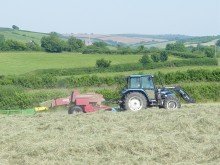Measures that once stood to benefit European wildlife could be diluted in a series of possible exemptions following a ‘trilogue’ between the EU commission, MEPs and agricultural ministers. The meeting in Brussels has begun a process that stands to unravel years of improved biodiversity in our agricultural areas.
Dorset is a county rich in Areas of Outstanding Natural Beauty (40% of the county is an AONB) with 85% of this land under active agricultural management. Under the latest outcomes of the Common Agricultural Policy (CAP) reform, Dorset’s idyllic countryside, with its vast tracts of hedgerows, wild meadows and grasslands vital to the prosperity of local, national and internationally important flora and fauna, could be at risk.
The principle that 30% of direct payments on the CAP should be focused on the environment has been established, but then only to be undermined, by a host of compromises. For example, the area farmers are now required to identify for nature (Ecological Focus Areas or EFAs) will fall from 7% to 5% – a measure only applicable to a percentage of arable farms over 15 hectares.
Many decisions are still yet to be made, however these may further weaken the potential of reform to give the best possible results for the environment. Potentially a real missed opportunity to boost the sustainability and biodiversity of our farms.
EFAs are often placed in arable field margins, these hotspots for biodiversity are prevalent large areas of the county, such as the limestone soils of the Purbecks, and act as a much needed sanctuary for some of the 1,064 farmland species identified in the State of Nature Report of which 60% have decreased and 34% have decreased strongly.
Here in the south west of the UK we have one of the greatest numbers of hedgerows, some of which can support up to 750 species of invertebrates! Alongside field margins, hedgerows might soon be credited as EFAs by farmers looking to qualify for CAP ‘greening’ payments. With a reduction in the percentage of land needed to qualify for this greening payment, our hedges – acting as vital wildlife corridors – are under threat from continuing their function as a means of protecting and dispersing diverse species in an otherwise fractured landscape.
Debbie Watkins, manager of the West Dorset Living Landscape team at Dorset Wildlife Trust, said: “Dorset Wildlife Trust is trying to influence new agri-environemntal, greening, and rural development plans in a bid to secure the best deal for biodiversity and the environment from very constrained resources. There’s still a lot more negotiation to come and we will continue to engage at this level for a while longer, for the benefit of Dorset wildlife.”
The CAP reform could unravel 20 years of wildlife enriching work undertaken by farmers and landowners and may have a negative impact on the wildlife that thrives in these corridors of agriculturally managed ecosystems.
However, The Wildlife Trusts believe that the UK Government will be able to use the flexibility that the CAP reform has provided for Member States, to maximise positive outcomes for the environment. Paul Wilkinson, Head of Living Landscape for The Wildlife Trusts, explains:
“Because of the flexibility that will be afforded to Member States in the way they deliver greening measures, there is still an opportunity for the UK to adopt an approach that is more robust than the extremely disappointing basic measures agreed. We recognise Secretary of State Owen Paterson’s stated commitment to improve the natural environment and call on him to ensure that the value for nature of Ecological Focus Areas and the other greening measures is maximised and to commit to supporting strategic planning of these areas across the farmed landscape. We need to see these areas linked in a coherent way to well funded new agri-environment schemes.”







